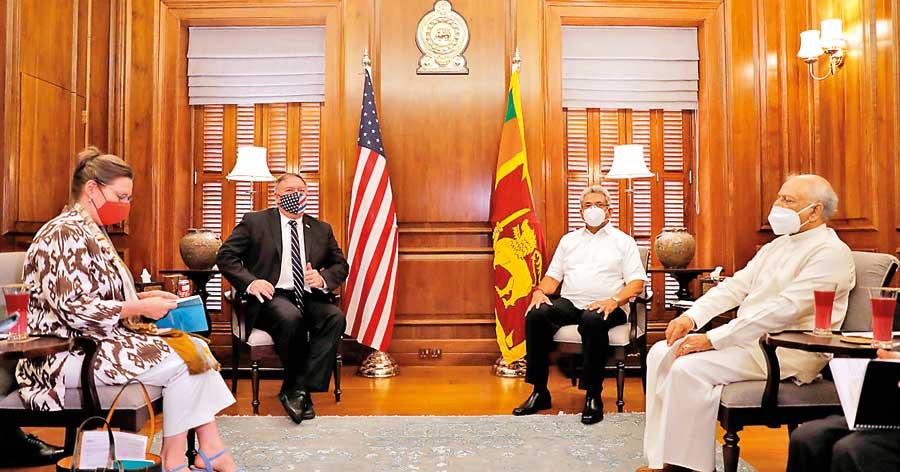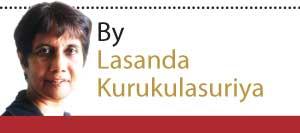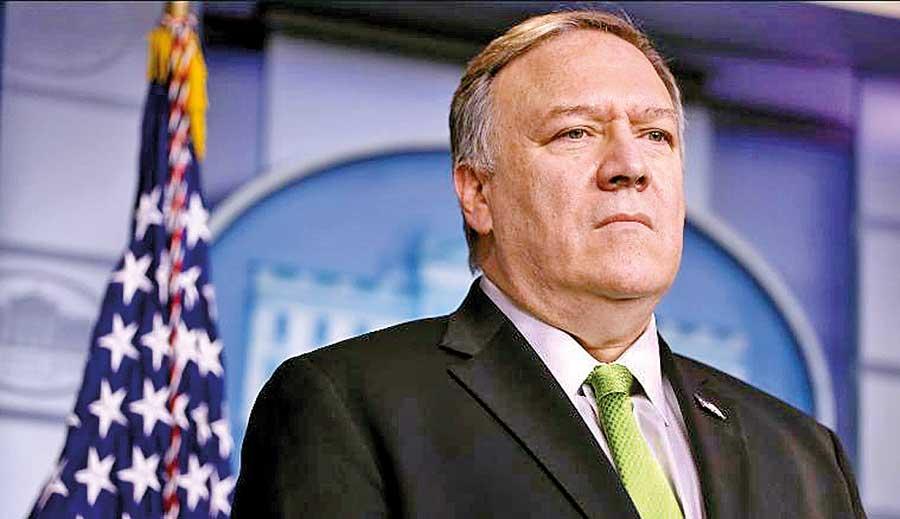Reply To:
Name - Reply Comment

US Secretary of State Mike Pompeo’s whirlwind visit last week has left in its trail many unanswered questions.
It’s clear that for the US, this trip was all about signing up allies in its all-but-declared war against China, under the rubric of what it calls a ‘free and open Indo Pacific.’
The messages coming across from the two governments revealed a certain disconnect. Concluding his visit  Pompeo tweeted that his meetings with President Gotabaya Rajapaksa and Foreign Minister Dinesh Gunewardena “reaffirmed Sri Lanka’s pivotal role as an Indo Pacific partner.” But there is nothing endorsing this assertion from the government. President Rajapaksa tweeted that he appreciated Pompeo’s stance on “the need to strengthen the bilateral relationship and support for defence cooperation” and valued Pompeo’s views “on assistance for investment and our development needs.”
Pompeo tweeted that his meetings with President Gotabaya Rajapaksa and Foreign Minister Dinesh Gunewardena “reaffirmed Sri Lanka’s pivotal role as an Indo Pacific partner.” But there is nothing endorsing this assertion from the government. President Rajapaksa tweeted that he appreciated Pompeo’s stance on “the need to strengthen the bilateral relationship and support for defence cooperation” and valued Pompeo’s views “on assistance for investment and our development needs.”
Pompeo engaged in China-bashing at every turn, calling the Chinese Communist Party a ‘predator’ and accusing it of bringing “bad deals, violations of sovereignty and lawlessness on land and sea.” The United States “comes in a different way … as a friend and as a partner” he said, according to a US embassy transcript of a joint media briefing.
So is this the ‘difficult but necessary decision’ that a senior US official, ahead of Pompeo’s travel, urged Sri Lanka to make? To choose between the ‘good guys’ and the ‘bad guys?’ Many developing countries view Chinese money as a lifeline in difficult economic times. It’s known that Beijing does not interfere in the internal affairs of host countries, as a pre-condition for its loans and grants. The US on the other hand has a long history of meddling in other people’s elections, staging CIA-backed coups and propping up US-friendly dictatorships.
Not surprisingly, Pompeo’s bid to vilify China gained no traction in Sri Lanka. This was partly reflected in questions from the media: Is the US seeking to get MCC and SOFA agreements signed in its bid to counter Chinese influence? What if Sri Lanka does not comply? Why did he visit, just before a US election? What is the status of the US travel ban imposed on Army Commander Shavendra Silva?
In his talks with Pompeo, President Rajapaksa himself referred to China’s assistance with post-war infrastructure development, saying categorically that Sri Lanka was “not caught in a debt trap as a result.”
According to the President’s Media Division (PMD) “the President stressed that he is not ready to compromise the independence, sovereignty and territorial integrity of the nation in maintaining foreign relations whatever the circumstances may be.” Minister Gunewardena said that Sri Lanka’s foreign policy “will remain neutral, non-aligned and friendly.” He referred to “the importance of maintaining the freedom of navigation in our seas and airspace,” but avoided the terminology of ‘free and open Indo Pacfic.’
The dissonance in language used by the two sides has led to questions in some quarters as to what really transpired in the meetings, and whether any understandings were reached. A US State Department readout referred to US commitment to ‘advancing shared interests in a free and open Indo Pacific region.’ What are these ‘shared interests?’ What exactly is the ‘defence cooperation’ that the ‘two sides agreed to strengthen,’ as mentioned by the PMD? In the absence of a joint statement, the remarks on either side will assume importance, as they come against the backdrop of an ongoing US exercise to win partners for a broad anti-China alliance in the Asia Pacific and Indian Ocean regions.
Purpose of visit
Many, including influential sections of the Buddhist clergy have demanded to know the purpose of former CIA Director Pompeo’s visit at this particular moment in time. Minister Vasudeva Nanayakkara grumbled that inquiries from the foreign ministry had not yielded a satisfactory response, publicly saying “Even we don’t
know why he came.”
An answer to this question came from Sri Lanka’s former ambassador to the UN Tamara Kunanayakam during ‘Newsline’ TV programme of 27.10.20 - the day Pompeo arrived. “At the moment, the primary focus of US strategy is war against China. That’s why the US Secretary of State Pompeo is coming here” she said. That is the new China policy announced in July she added. “We are talking about regime change” (meaning, the overthrow of the Chinese Communist Party).
Asked by Derana TV what will happen if Sri Lanka finds it ‘politically challenging’ to sign the MCC pact, Pompeo said “If it doesn’t make sense for Sri Lanka, the Sri Lankans will choose not to accept that.”
Kunanayakam in her forthright remarks revealed some lesser known aspects of the MCC agreement, that might possibly explain Pompeo’s seeming indifference to possible rejection of the MCC. “What’s unique about MCC aid is that the conditions have to be implemented before you get the money, the money is only a reward for re-structuring the State” she said.“Its not development aid money. … it is a package that comes with ACSA and SOFA.”
It’s relevant to mention here the State Land (Special Provisions) Bill, the provisions of which were in the nature of a pre-condition for the MCC grant. The Bill was brought by the previous yahapalana government and later withdrawn after it was challenged in the Supreme Court.
Peace talk
Pompeo, in talks with the President, said “The United States wishes to see that the Indian Ocean remains a zone of peace,” according to the PMD. The remark is puzzling, seeing that he arrived fresh from talks in New Delhi where Washington had just concluded a landmark defence agreement. The BECA (Basic Exchange and Cooperation Agreement) is the final ‘foundational’ defence agreement the US has with India. According to Indian media “It will allow India to gain access to precision data and topographical images” from US military satellites.
This data will “allow India to keep a close watch on the movements of Chinese warships in the Indian Ocean” said NDTV. Pompeo’s visit also comes ahead of the Malabar naval exercise in November where the US will flex its military muscle in the Bay of Bengal alongside Quad members India, Japan and Australia.
How could these actions, that signal increasing militarisation of the Indian Ocean, advance the Zone of Peace concept? Rather, they seem to indicate that having supported a massive military build-up in the Asia Pacific, the US is now doing the same in the Indian Ocean.
We need to take note that Pompeo, like American interlocutors before him, did not forget to mention that the US expects Sri Lanka to ‘fulfill its pledges’ in relation to ‘accountability, justice, and reconciliation.’ Human rights was weaponised by the US through a 2015 resolution against Sri Lanka at the UNHRC, and the message here is that this weapon has not been laid down.
